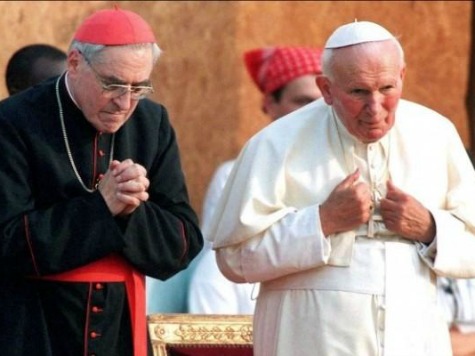Starting on May 1 with a gala honoring legendary actor Carl Reiner at the newly named Steve Tisch Cinema Center at the Saban Theater in Beverly Hills, California, the 9th Annual Jewish Film Festival (LAJFF) aims to celebrate Jewish heritage and build community by offering contemporary films exploring Jewish culture, heritage, and creativity.
This year, following close on the heels of the April 27 canonizations of Popes John Paul II and John XXIII, the festival ends on May 8 with the Los Angeles premiere of “The Jewish Cardinal.” (Click here to see a trailer.) The event will be held at the ArcLight Cinemas in Sherman Oaks, in the San Fernando Valley.
Directed by Ilan Duran Cohen, the 2012 French fact-based drama (in French with English subtitles) tells the true story of Jean-Marie Lustiger, the son of Polish-Jewish immigrants, who maintained his cultural identity as a Jew even after converting to Catholicism at a young age and later joined the priesthood. (His father attended Lustiger’s 1945 ordination, sitting near the back.)
Lustiger was born Aaron on September 17, 1926. (Jean-Marie was added at his baptism.) He was appointed Archbishop of Paris by Pope John Paul II, to whom he was both a friend and an adviser. Lustiger also stood with the now-sainted pope–who has been credited in his own right with revolutionizing Catholic-Jewish relations–at the 1997 World Youth Day (a festival established by John Paul II to gather young Catholics from around the world every two or three years in a different city) when the event drew over a million people in Paris, the city of his birth.
One of Lustiger’s grandparents had been a rabbi in Poland, but his parents were not observant. By all accounts, his decision to become Catholic and be baptized in the summer of 1940 was done against his parents’ wishes. Shortly afterward, his sister Arlette was also baptized.
An obituary in The Guardian said, “Lustiger always said that in becoming a Catholic, he had never ceased to be a Jew, and that his conversion was in some sense a completion of his Judaism, as the New Testament was the completion of the Old.” Furthermore, “by the end of his life, he had succeeded in winning the respect of both the French-Jewish community and of most French Catholics as well.”
Lustiger requested that a commemorative marble plaque inside Notre Dame Cathedral read: “I was born a Jew. I received the name of my paternal grandfather Aaron. Christian by faith and by baptism, I remained a Jew, as did the Apostles.”
Lustiger’s insistence on his dual identity was put to the test when Carmelite nuns attempted to found a convent just outside the barbed-wire perimeter of the infamous Auschwitz concentration camp in Poland in the late ’80s and early ’90s. Lustiger–whose own mother had died at Auschwitz in 1942–found himself a mediator between Jewish protesters and the Catholic Church.
Archbishop and later Cardinal Lustiger (who participated in the election of Pope Emeritus Benedict XVI in 2005) was the voice of French Catholics for almost 25 years before retiring in 2005; he passed away two years later at the age of 80.
French President Nicholas Sarkozy announced Lustiger’s death, stating:
The spiritual journey of Cardinal Lustiger remained at the same time both an example and a great mystery. Having lived in his own sinews both the continuity between Judaism and Christianity and also the originality of the Christian message that leads certain individuals to the total and all-important gift of their persons, Jean-Marie Lustiger was the complete image of the man of faith and of the interior life.
Said Hilary Helstein, the LAJFF’s executive director, of why the film was chosen:
First of all, it’s about a very interesting man in history, with a very interesting story. He was a close confidante to Pope John Paul II. Through being a Catholic Jew, I should say, he was able to help put a stop to the anti-Semitism that had been on an uprise in Poland.
Obviously, he’s a very well-respected man, to rise to the level that he did, because of his commitment to Catholicism. But he always maintained his identity as a Jew.
It’s a film that’s never been seen in Los Angeles, and I thought that it was important to be able to bring a story like this to Los Angeles.
In cooperation with the American Jewish Committee, a question-and-answer session with Rabbi Mark Diamond, regional director of the American Jewish Committee, and Father Alexi Smith, Ecumenical and Interreligious Officer of the Archdiocese of Los Angeles, will follow the film. The moderator is Naomi Pfefferman Magid, arts and entertainment editor of the Jewish Journal.
Helstein said:
They will have a discussion coming from both sides and be able to address any issues, any questions from the audience. But more than anything, this is a story about a very passionate man, who is very interested in creating good relationships between the Catholic and Jewish community.
It was important for him to have a foot in both worlds.

COMMENTS
Please let us know if you're having issues with commenting.